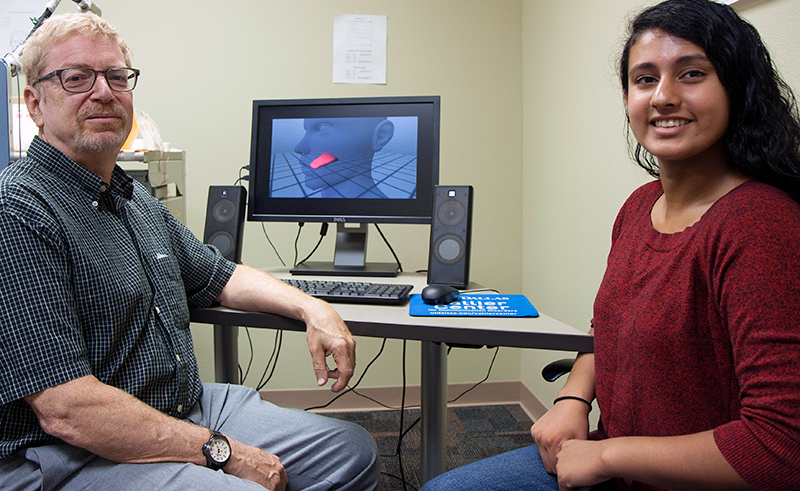
Dr. William Katz, a professor of speech science and neurolinguistics in the School of Behavioral and Brain Sciences, and Divya Prabhakaran, a senior at Plano East Senior High School, have worked together to research systems that provide visual feedback for speech therapy patients.
A UT Dallas professor’s collaboration with a local high school student has resulted in a scholarly paper, an upcoming professional presentation and numerous awards and accolades for the up-and-coming scientist.
For the past two years, Divya Prabhakaran, a senior at Plano East Senior High School, has worked with Dr. William Katz, a professor of speech science and neurolinguistics in the School of Behavioral and Brain Sciences, to research systems that provide visual feedback for speech therapy patients.
“She’s really a self-starter,” Katz said. “I just described to her what we were doing in our lab and she got on board, designed her own experiment and ran it.”
Divya is the daughter of Dr. Balakrishnan Prabhakaran, a professor in the Erik Jonsson School of Engineering and Computer Science. Dr. Prabhakaran said Divya has been participating in science fairs since she was in elementary school.
“As a parent, it feels really good to see her doing this,” he said. “Dr. Katz has been such a motivating personality. I think he brought out the best in her, in terms of giving her the right amount of freedom and guiding her in the areas where she needed guidance.”
Divya also credited Katz for supporting her scientific achievements over the last two years.
“I would say he's one of the reasons I've gotten really interested in doing research,” Divya said. “Dr. Katz has taught me a lot, encouraged me to explore topics I'd want to study, and always has been very supportive.”
“She’s really a self-starter. I just described to her what we were doing in our lab and she got on board, designed her own experiment and ran it.”
Dr. William Katz, a professor of speech science and neurolinguistics in the School of Behavioral and Brain Sciences
Katz, who works out of the Callier Center for Communication Disorders, was one of the first researchers to suggest that the visual feedback on tongue movements could help stroke patients recover speech. Divya’s project focused on a kind of compensatory behavior by speech patients called vowel formant frequency shifting. This type of research provides valuable information about how people plan speech.
“You think you are saying the word ‘had’ but, somehow, little by little, you say ‘head.’” Katz said. “We show a visual representation of a tongue moving from an ‘e’ sound to an ‘a’ sound. People shadowed what they saw but didn’t know they were making the transition.”
Divya’s work has brought her first-place awards at the Dallas Regional Science and Engineering Fair and the Texas Science and Engineering Fair. Earlier this year, she placed fourth in the Behavioral and Social Sciences category at the Intel International Science and Engineering Fair.
Divya will present a research paper that she co-authored with Katz, “Sensorimotor Response to Visual Imagery of Tongue Displacement,” at Interspeech, an annual conference that covers speech science and technology.
“I am excited to attend a conference for the first time,” Divya said. “I think it'll be a fun experience, and I’m looking forward to meeting other researchers in the field.”
The young scientist has applied to several colleges for admission in 2017, including UT Dallas. In the meantime, she will continue to mix in university research and lab meetings with her high school classes and activities.
“I'm able to meet Dr. Katz and do research on weekdays after school,” Divya said. “Even if I don't get home until 7 or 8, it's a nice change of pace from just doing schoolwork all the time.”
Divya and Katz already are collaborating on a related experiment with people who have Parkinson’s disease.
“Our plan is to submit the research focusing on Parkinson’s disease as a journal paper soon,” Divya said.